- Opposites attract - 26th February 2026
- Upset coffee - 25th February 2026
- Not acting the part - 24th February 2026
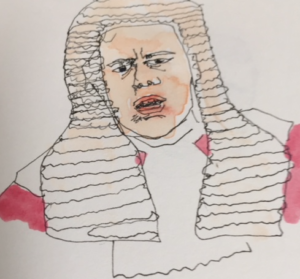 During 23 years with BBC Cymru Wales (BBC CW), and 38 years in journalism (when he was trained to use clear and simple language, avoiding jargon), our Editor Phil Parry has always known that all stories are governed by legal rules and must not be open to court action, however here he looks at while the basics are unchanged, today they have altered and are different in other countries.
During 23 years with BBC Cymru Wales (BBC CW), and 38 years in journalism (when he was trained to use clear and simple language, avoiding jargon), our Editor Phil Parry has always known that all stories are governed by legal rules and must not be open to court action, however here he looks at while the basics are unchanged, today they have altered and are different in other countries.
In the past he has described how he was assisted in breaking into the South Wales Echo office car when he was a cub reporter, recalled his early career as a journalist, the importance of experience in the job, and made clear that the ‘calls’ to emergency services as well as court cases are central to any media operation.

He has also explored how poorly paid most journalism is when trainee reporters had to live in squalid flats, the vital role of expenses, and about one of his most important stories on the now-scrapped 53 year-old BBC CW TV Current Affairs series, Week In Week Out (WIWO), which won an award even after it was axed, long after his career really took off.
Phil has explained too how crucial it is actually to speak to people, the virtue of speed as well as accuracy, why knowledge of ‘history’ is vital, how certain material was removed from TV Current Affairs programmes when secret cameras had to be used, and some of those he has interviewed.
He has disclosed as well why investigative journalism is needed now more than ever although others have different opinions, how the pandemic played havoc with media schedules, and the importance of the hugely lower average age of some political leaders compared with when he started reporting.

Over decades in journalism successive News Editors (now known as ‘content editors’) have drummed into me the importance of KNOWING THE LAW!
The fundamental rules do not change, although they alter all the time at the edges, and today social media has made them even more acute. They are also different in other countries.

I was reminded of this basic fact by the news this week that the veteran broadcaster Andrew Neil says he has launched legal action against Jennifer Arcuri, the US businesswoman and former lover of Boris Johnson, after she made claims about his inclusion in a contact book owned by the deceased paedophile Jeffrey Epstein.
In a public spat that started with a disagreement over the effectiveness of Covid-19 vaccines, Ms Arcuri tagged him in a now-deleted tweet that read: “Citation for @afneil: Not only is he a paid for pharma puppet but here he is on the pedo elite train. Everyone knows what happened on that plane”.

Alongside were the hashtags #itsOver and #ticktock, a picture of Mr Neil arm in arm with a woman, and a screengrab from Epstein’s address book purportedly showing Mr Neil’s name.
Mr Neil wrote in response: “I have clicked to follow you. Please DM your address/contact details so my lawyers can serve legal papers against you for this clear libel and defamation. I’ve instructed the papers to be drawn up now. All those tweeting support for and spreading her tweet will also be served”. To this, Arcuri responded: “You really are threatened by me @afneil. Thank you for confirming. Now the world sees exactly what you are”.


Mr Neil, who was chairman of GB News until he resigned this Summer, replied to Ms Arcuri again, writing: “I will not engage in a public Twitter spat with you, though every subsequent tweet you make just makes it worse. Please just DM your address to me so we can begin the necessary legal action against you. Thank you”.
In another tweet, Mr Neil wrote that he had taken the action “not just to hold Arcuri, who I’ve never met and have no interest in, to account but, more important, to establish that the twitterati can’t just promulgate evil lies without consequences. If you think anonymity will protect you, you’re in for a big surprise”.
 Also, under British law, it is possible to ask a court to make something called a Norwich Pharmacal order – named after the 1970s case that established the principle – and request that sites such as Twitter hand over any information they may hold on an account, like the email used to register it and other identifying markers.
Also, under British law, it is possible to ask a court to make something called a Norwich Pharmacal order – named after the 1970s case that established the principle – and request that sites such as Twitter hand over any information they may hold on an account, like the email used to register it and other identifying markers.
A vital plank of a libel case like this is to prove that the comment in question has been PUBLISHED to a third party.
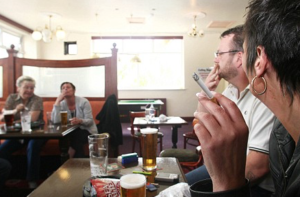
In other words you won’t get sued for telling your mate something in a pub, but if you PROCLAIM it in, say, a newspaper piece or book, then you might. Social media means a comment like Ms Arcuri’s has indeed been published to a third party, hence the legal action.
All stories on The Eye are double-checked by a libel lawyer, but people seem to be unaware of the legal rules limiting any piece which is published, and they write the most appalling things (naming an individual or organisation) on Twitter or Facebook (FB).

This is a developing area legally, and one of the key issues is that these remarks online can, obviously, be read in all countries of the world, so lawyers are looking at whether THEIR country’s legal rules then apply.
As long as the named individual or organisation in the tweet resides in, for example, America, then THAT country’s legal rules must be adhered to; however if the person or body is in another country, then THOSE laws may also apply.

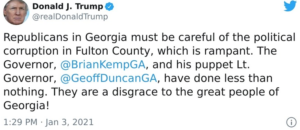 This is why, for instance, the former US President Donald Trump has, apparently, felt free to make the most awful remarks on Twitter, seemingly in the knowledge that as long as he doesn’t name anybody in another country (like Mr Neil), then he can’t be touched. But perhaps I am imbuing him with more intellect than he actually possesses (which can be defended in a UK court as ‘Honest Comment’, or as it used to be known ‘Fair Comment’ incidentally)!
This is why, for instance, the former US President Donald Trump has, apparently, felt free to make the most awful remarks on Twitter, seemingly in the knowledge that as long as he doesn’t name anybody in another country (like Mr Neil), then he can’t be touched. But perhaps I am imbuing him with more intellect than he actually possesses (which can be defended in a UK court as ‘Honest Comment’, or as it used to be known ‘Fair Comment’ incidentally)!
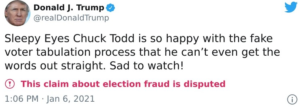 In the past he has called his Democratic rival Hillary Clinton “crooked”, and has made the most terrible observations about Republican Ted Cruz.
In the past he has called his Democratic rival Hillary Clinton “crooked”, and has made the most terrible observations about Republican Ted Cruz.
Even earlier this year plain old MR Trump said that Mr Cruz was “violent and vicious” towards him, during the primaries of 2016.
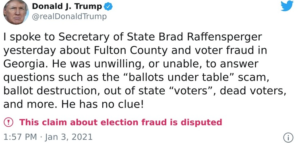 In the past Trump has used Twitter to describe the respected left-wing anti-fascist and anti-racist political movement ANTIFA, as a “Terrorist Organisation”. He has said there was “political corruption” in a county in Georgia, naming as a “puppet Lt.” Governor Geoff Duncan. Trump has accused on the social media site, the high-profile television journalist Chuck Todd of being “Sleepy Eyes”, and that he was “so happy with the fake voter tabulation process”. He declared that the former Republican representative and Secretary of State for Georgia Brad Raffensperger has “no clue”.
In the past Trump has used Twitter to describe the respected left-wing anti-fascist and anti-racist political movement ANTIFA, as a “Terrorist Organisation”. He has said there was “political corruption” in a county in Georgia, naming as a “puppet Lt.” Governor Geoff Duncan. Trump has accused on the social media site, the high-profile television journalist Chuck Todd of being “Sleepy Eyes”, and that he was “so happy with the fake voter tabulation process”. He declared that the former Republican representative and Secretary of State for Georgia Brad Raffensperger has “no clue”.
 Clearly these sort of announcements are highly libellous, and if they involved individuals in the UK, they could have faced legal action, yet because they were in the US they have not (so far).
Clearly these sort of announcements are highly libellous, and if they involved individuals in the UK, they could have faced legal action, yet because they were in the US they have not (so far).
As a result of these (and other outrageous tweets), Trump was banned by Twitter in January.

Yet is obvious that when engaging in communication online, even in Britain, people have NO CLUE (to use a Trump phrase!) of the legal rules.
A recent comment about The Eye’s story concerning a television ‘reporter’ who had posted pictures of herself on FB or Twitter in skimpy clothes, is typical of the insults I constantly receive: “Your article on Ellie Pitt was bordering on mysogynistic bullying, a really pathetic article written by a bitter individual who was a complete failiure as a BBC correspondent and also loved bashing the Catholic Church with your disgraceful Panorama programme”.

Indeed accusations of being ‘misogynistic’ (which is the correct spelling) ‘sexist’, or ‘misogynist’ are a constant refrain among those who hurl abusive comments, if factual stories are published with the targets happening to be women, yet these are potentially libellous words, and the description is provably wrong.
In the past I have also been accused online (incorrectly) of being a “bastard” (many times), an “anti-devolutionist wanker”, “pure scum”, a “liar” (also many times) a “little git”, and (correctly) a “nosey git”, “irritating”, or a “nuisance”. But these remarks come amid many others. Too many, in fact, to mention.
I have tried not to read them, although I must admit I have not always been successful, and rarely sue (although I do sometimes).
Some of these online utterances can be rebutted in court using an ‘Honest Comment’ defence, most cannot though, which means that any libel case is likely to be successful.

It seems a shame the people behind those insults are not, apparently, aware of such legal rules.
However even Trump (who is not known for his computer prowess and employs other people to do most of his tweets) using a defence like this in the UK, might be stretching it a bit!
The memories of Phil’s decades long award-winning career in journalism (when online abuse was rare at the beginning) as he was gripped by the incurable neurological condition, Hereditary Spastic Paraplegia (HSP), have been released in a major book ‘A GOOD STORY’. Order it now!

Publication of another book, however, was refused, because it was to have included names









